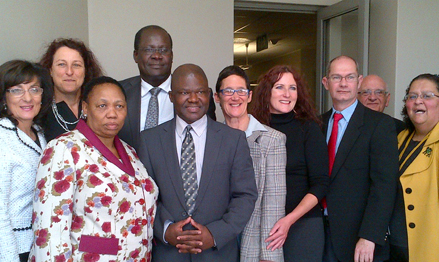Latest News Archive
Please select Category, Year, and then Month to display items
02 January 2025
|
Story Gerda-Marie van Rooyen
|
Photo Supplied
 Leading the research in South Africa is Prof Linus Franke from the Department of Soil, Crop and Climate Sciences.
Leading the research in South Africa is Prof Linus Franke from the Department of Soil, Crop and Climate Sciences.
Scientists are actively pursuing the successful breeding of diploid hybrid potatoes from inbred lines. This is expected to revolutionise potato breeding as it holds the key to rapid genetic progress. It will introduce new varieties for commercialisation through seed. Currently, existing potato variants have a gene that renders self-pollinated seeds infertile.
Prof Linus Franke, an academic in the Department of Soil, Crop and Climate Sciences at the UFS, is leading the research in South Africa. “This technology allows the production of genetically uniform potato seed that is easy to transport and largely disease-free.” He says this differs from conventional breeding whereby only vegetative propagation is possible due to tetraploid varieties in potatoes. It also risks carrying pests and diseases from one generation to the next – leading to the accumulation of pests and diseases with each round of multiplication.
Seed innovation
Prof Franke explains that Solynta BV, a seed company based in the Netherlands that produces potato varieties that can be grown from seed, has included South Africa in their research efforts because it is one of Africa’s largest producers and exporters. Through his academic relationship with Wageningen University and Research, a Dutch institution renowned for its agricultural endeavours and food production, the UFS became involved in researching hybrid potatoes grown from seed.
Diploid seeds containing two sets of chromosomes allow easier gene manipulation to increase predictability and speedier genetic progress. The breeding approach enables the incorporation of tolerance to pests, diseases, abiotic stresses (cold, heat, drought) and other desired genetic traits.
Although Prof Franke is optimistic about this research, he is not blind to disadvantages. “Potato seeds are tiny and have little energy reserves, making it harder to grow potatoes from seed than from tubers.” He says potatoes from seed will take longer to cultivate than tubers, as farmers need to grow plantlets from seeds first, adding six weeks to the growing period. “It is possible that commercial farmers can grow potatoes directly from seed. Alternatively, perhaps more likely, specialised growers will produce tubers of potatoes from seed; these tubers are then sold as seed tubers to other potato farmers, who then continue their normal practices of producing potatoes for the market from tubers.”
Financial benefits
Prof Franke says farmers have reason to get excited. “Seed potatoes will reduce input costs, as varieties with enhanced tolerance to pests and diseases require less pesticides. Planting one hectare of potatoes requires three to four tonnes of potato tubers, but only one 25 g packet of potato seeds.” Since potatoes are a more valuable commodity than maize, this technology might also increase farmers’ income potential.
UFS plays leading role in implementing curriculum for deaf learners
2013-08-15
|
 |
Minister Angie Motshekga (front left) joined by members of the South African Sign Language task team. Behind Minister Motshekga’s shoulder is Dr Philemon Akach.
15 August 2013 |
South African Sign Language (SASL) will soon be offered as a school subject to Grade 0–12 learners in all 42 schools for the deaf in South Africa. Our Department of South African Sign Language had a role to play in this significant development that will empower deaf learners in South Africa and the continent.
Dr Philemon Akach, Head of the Department of South African Sign Language at the UFS, is part of the nine-member task team that recently handed over the SASL curriculum to the Minister of Basic Education, Angie Motshekga. The curriculum will be offered as a home language in all schools from 2014 and Grade 12 learners will be able to write it as a final-year examination subject.
Dr Akach – a member of the task team since 2009 – helped to coordinate the development of the curriculum.
The implementation of the curriculum means a lot to the Department of South African Sign Language, Dr Akach says. “We have championed the linguistic needs of the deaf community ever since we became the first university to offer SASL as an academic course, not only in South Africa, but also on the continent.”
Dr Akach says most Education students are already taking SASL as subject in his department, equipping them as prospective teachers to make implementation of the curriculum a smooth one. “Given our expertise, we will train teachers in the field and be involved in the setting and moderation of exam papers. The University of the Free State is no doubt a leader in this field.”